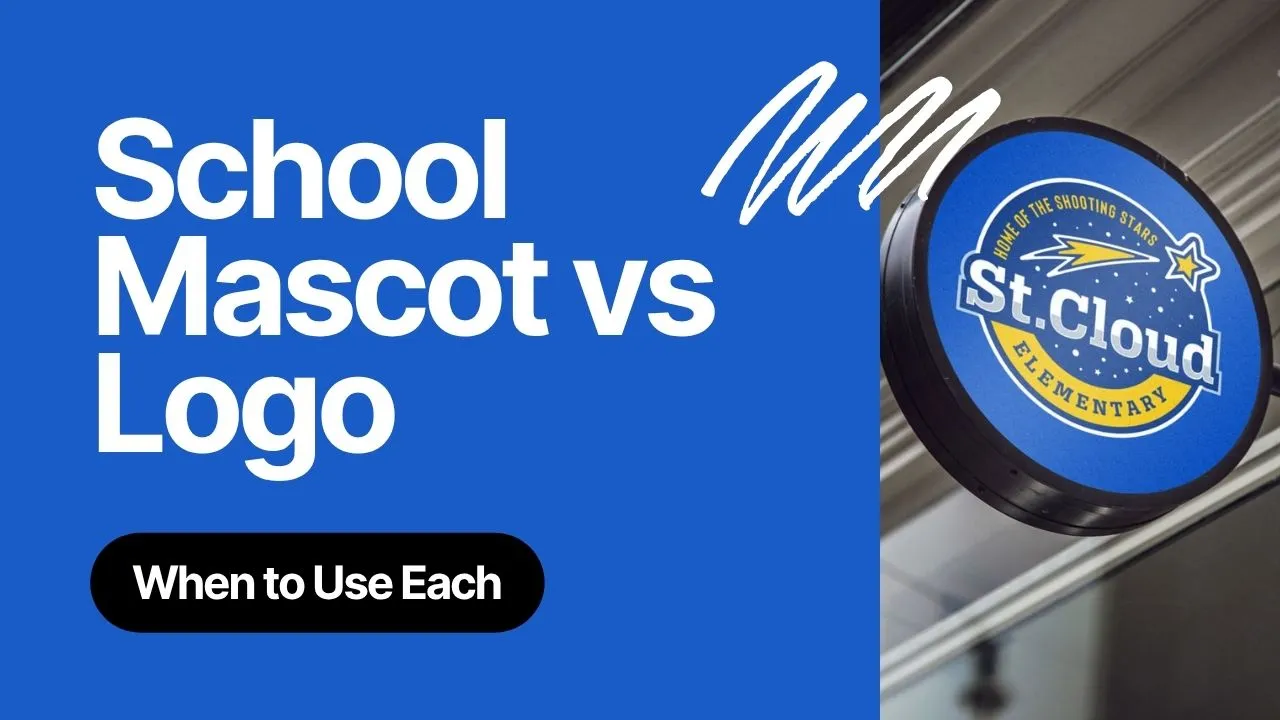School Branding Blog
School Mascot vs Logo: Key Differences + When to Use Each

School Mascot vs Logo: What’s the Difference and Which Does Your School Need?
One of the most common questions we hear from school administrators is: “Should we have a mascot or a logo?” The confusion is understandable—both serve as visual representations of your school, but they function very differently and serve distinct purposes in your overall brand strategy.
The truth is, most successful schools use both, but understanding when and how to use each is crucial for creating a cohesive visual identity that works across all applications, from business cards to stadium banners.
After designing visual identity systems for 250+ schools, we’ve learned that the mascot vs. logo decision isn’t either/or—it’s about understanding how these elements work together to create a complete brand system.
Understanding the Fundamental Differences
What is a School Logo?
A school logo is a symbolic mark that represents your institution in its most essential form. Professional school logo design creates memorable, versatile marks that work across all applications. It’s typically:
- Simple and geometric: Clean lines, minimal details
- Highly versatile: Works at any size, from favicon to billboard
- Professional: Appropriate for all formal communications
- Timeless: Designed to remain relevant for decades
- Functional: Optimized for practical applications
Primary Uses:
- Official documents and letterhead
- Website headers and digital applications
- Business cards and professional materials
- Small-scale applications (social media profiles, app icons)
- Formal communications with parents and community
What is a School Mascot?
A school mascot is a character or figure that embodies your school’s spirit and personality. Our school mascot logo design services create mascots that students love and communities rally behind. It’s typically:
- Detailed and expressive: Rich in character and personality
- Emotionally engaging: Designed to create connection and excitement
- Spirit-focused: Primarily used for athletics and school pride
- Flexible in expression: Can be adapted for different moods and contexts
- Community-building: Unifies students, staff, and supporters
Primary Uses:
- Athletic uniforms and equipment
- Spirit wear and merchandise
- School events and rallies
- Social media content and marketing
- Building murals and large-scale graphics
The Strategic Differences: When to Use Each
Logo Applications: Professional and Formal
✅ Use Your Logo For:
- Administrative Communications: Board presentations, official reports, policy documents
- Parent Communications: Report cards, newsletters, formal announcements
- Digital Presence: Website headers, email signatures, online directories
- Professional Materials: Business cards, letterhead, official signage
- Small Applications: Social media profile pictures, mobile app icons
Why Logos Work Better: These applications require clarity, professionalism, and functionality at small sizes. A detailed mascot would become illegible or inappropriate.
Mascot Applications: Spirit and Engagement
✅ Use Your Mascot For:
- Athletic Programs: Uniforms, equipment, team banners, stadium graphics
- School Spirit: Pep rallies, homecoming materials, student events
- Merchandise: T-shirts, hoodies, water bottles, school supplies
- Marketing: Recruitment materials, social media content, community outreach
- Environmental Graphics: Hallway murals, cafeteria graphics, gymnasium displays
Why Mascots Work Better: These applications benefit from emotional connection, personality, and visual impact. A simple logo wouldn’t create the same level of engagement.
Common Misconceptions and Mistakes
Misconception 1: “We Only Need One or the Other”
The Reality: Most successful schools need both. Using only a logo can feel sterile and corporate. Using only a mascot can appear unprofessional in formal contexts.
The Solution: Develop a complete visual identity system that includes both elements, with clear guidelines for when to use each.
Misconception 2: “Our Mascot Can Work as Our Logo”
The Problem: Mascots are typically too detailed and complex to function effectively as logos, especially in small applications or single-color reproduction.
Example Issues:
- Mascot becomes illegible when reduced to favicon size
- Complex details disappear in embroidery or single-color printing
- Looks unprofessional on formal business documents
- Doesn’t work well in horizontal layouts
Misconception 3: “Logos Are Just for Businesses”
The Reality: Educational institutions need professional visual identity just as much as businesses. Parents, staff, and community members expect polished, professional presentation.
Professional Benefits:
- Builds trust with prospective families
- Enhances credibility in grant applications
- Improves staff recruitment and retention
- Strengthens community partnerships
Creating a Cohesive Visual Identity System
The Three-Tier Approach
Tier 1: Primary Logo (Most Important)
- Simple, versatile mark for all professional applications
- Works in single color and at any size
- Represents the school’s core identity
Tier 2: Mascot Character (Spirit and Engagement)
- Detailed character for athletics and school spirit
- Multiple expressions and poses available
- Builds emotional connection and community pride
Tier 3: Supporting Elements (Complete System)
- Typography standards
- Color palette guidelines
- Pattern and texture elements
- Icon and symbol library
Ensuring Visual Harmony
Color Consistency: Both logo and mascot should use the same color palette Style Alignment: Visual elements should feel like they belong to the same brand family Proportional Relationship: Elements should work well together when used in combination Clear Hierarchy: Guidelines should specify when each element takes priority
School Type Considerations
Elementary Schools: Character-Forward Approach
Recommendation: Lead with mascot character, supported by simple logo Reasoning: Young students connect more with characters and personalities Application Balance: 70% mascot applications, 30% logo applications
Example Strategy:
- Primary: Friendly animal mascot with multiple expressions
- Secondary: Simple geometric logo for administrative use
- Integration: Mascot and logo share colors and basic design elements
Middle Schools: Balanced Approach
Recommendation: Equal emphasis on both mascot and logo Reasoning: Transitional age requires both professional credibility and spirit engagement Application Balance: 50% mascot applications, 50% logo applications
Example Strategy:
- Primary: Sophisticated mascot that appeals to maturing students
- Secondary: Clean, modern logo for growing professional needs
- Integration: Seamless system that works for both audiences
High Schools: Logo-Forward Approach
Recommendation: Lead with professional logo, supported by athletic mascot Reasoning: College preparation focus requires professional presentation Application Balance: 60% logo applications, 40% mascot applications
Example Strategy:
- Primary: Strong, collegiate-style logo for academic emphasis
- Secondary: Dynamic mascot for athletics and school spirit
- Integration: Both elements convey excellence and achievement
Budget Considerations: Phased Development
Phase 1: Essential Foundation ($3,000-$5,000)
- Primary logo development
- Basic mascot character
- Fundamental brand guidelines
- Core application templates
Phase 2: System Expansion ($2,000-$4,000)
- Additional mascot expressions
- Extended logo variations
- Comprehensive style guide
- Template library expansion
Phase 3: Full Implementation ($1,000-$3,000)
- Environmental graphics
- Merchandise development
- Digital asset optimization
- Staff training materials
Implementation Strategy: Rolling Out Your Visual Identity
Month 1: Internal Launch
- Train staff on proper usage
- Update digital applications (website, email signatures)
- Begin using new materials for internal communications
Month 2-3: External Communications
- Update parent-facing materials
- Launch new social media presence
- Begin transitioning printed materials
Month 4-6: Physical Environment
- Update signage and environmental graphics
- Launch new merchandise with updated branding
- Complete transition of all materials
Ongoing: Maintenance and Evolution
- Regular brand compliance audits
- Annual review of brand effectiveness
- Gradual refinements based on feedback
Success Stories: Schools That Got It Right
Henderson Collegiate: Integrated System Success
Challenge: New charter school needed both professional credibility and school spirit Solution: Developed complementary logo and mascot system
- Clean, collegiate logo for administrative use
- Dynamic eagle mascot for athletics and spirit
- Shared color palette and design principles
Results:
- 40% over-enrollment in first year
- Strong community recognition and support
- Successful merchandise program generating additional revenue
Woodbridge School District: District-Wide Consistency
Challenge: Multiple schools needed individual identity within unified district brand Solution: Master logo system with school-specific mascot variations
- District logo for all official communications
- Individual school mascots sharing design principles
- Consistent application guidelines across all schools
Results:
- Improved district cohesion and recognition
- Successful bond referendum with strong community support
- Enhanced school pride across all district schools
Making the Right Choice for Your School
Assessment Questions
For Logo Priority:
- Do you need to enhance professional credibility?
- Are you competing with private schools for enrollment?
- Do you have significant administrative and parent communications?
- Is your current visual identity too informal or outdated?
For Mascot Priority:
- Is school spirit and athletics a major focus?
- Do you need to build stronger community engagement?
- Are you trying to increase student pride and participation?
- Is your current mascot outdated or ineffective?
For Integrated System:
- Do you need both professional credibility and school spirit?
- Are you planning a comprehensive rebranding effort?
- Do you have budget for a complete visual identity system?
- Are you committed to long-term brand consistency?
Ready to Develop Your Complete Visual Identity?
Understanding the difference between mascots and logos is just the first step. The real impact comes from creating a strategic visual identity system that serves all your school’s needs while building lasting recognition and pride.
Our visual identity design service specializes in creating integrated logo and mascot systems that work seamlessly across all school applications. We help you determine the right balance for your specific needs and develop implementation strategies that maximize impact within your budget.
See integrated visual identity systems in action:
- Henderson Collegiate - Complete logo and mascot integration
- Woodbridge School District - District-wide visual consistency
- Bridgewater-Raritan High School - Professional logo with athletic applications
Whether you need a simple logo, a dynamic mascot, or a complete visual identity system, we can help you create a brand that serves your school’s unique needs and goals.
Ready to develop your visual identity strategy? Get a free brand consultation and discover the perfect balance of logo and mascot elements for your school’s success.
Part of our Mascot & Visual Identity content cluster.
This guide explains the difference between mascots and logos. For the complete mascot design process, read our pillar guide: Complete Guide to School Mascot Design - Step-by-step process, realistic budgets, timelines, and launch strategies from 250+ projects.
We Build and Manufacture Mascot Costumes
A professionally built mascot costume creates unforgettable moments at games, rallies, and community events.

See Full Details →
Design to Delivery
We manage everything
6-12 Week Delivery
In time for your season
Safety First
Ventilation & visibility
Starts at $2,500
Professional quality
About Mash Bonigala

Mash Bonigala is the Founder & CEO of School Branding Agency. Over the past 15 years, he's helped 250+ K-12 schools transform their brand identity and drive enrollment growth. From charter schools to public districts, Mash specializes in creating mascot systems and brand strategies that rally communities, boost school spirit, and convert prospects into enrolled families. Schedule a Zoom call to discuss your school →
Mascot logo design
Get an enrollment-ready mascot your community loves
Start with our mascot logo design service. We’ll craft a distinctive, on‑brand mascot system and rollout plan tailored for your school.
Get a Free ConsultationRelated
Charter Application Branding - Professional Identity for Authorizer Approval
Professional charter application branding that demonstrates operational readiness to authorizers. Complete brand identity, website, and application materials. Charter-specific packages from $8K.
View detailsRelated
Charter School Branding - Mascots & Identity (2025)
We help charter schools build mascots and identity systems that rally communities and support enrollment. See packages and proof.
View details